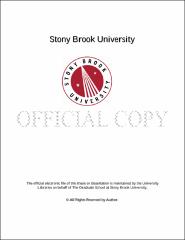| dc.identifier.uri | http://hdl.handle.net/11401/76761 | |
| dc.description.sponsorship | This work is sponsored by the Stony Brook University Graduate School in compliance with the requirements for completion of degree. | en_US |
| dc.format | Monograph | |
| dc.format.medium | Electronic Resource | en_US |
| dc.language.iso | en_US | |
| dc.publisher | The Graduate School, Stony Brook University: Stony Brook, NY. | |
| dc.type | Dissertation | |
| dcterms.abstract | I conduct empirical and experimental tests to highlight the impact of perceived commonality with racial-minority groups and its effects on subsequent political behavior among Asian Americans. This includes an exploration into how a shared identity interacts with Asian Americans’ racial identity to shape their subsequent political behavior. Using experimental treatments adopted from real-world messages in the news media, I show how exposure to the political derogation of both illegal and legal immigrant groups in the United States activates Asian Americans’ own racial identification and that the extent to which this identity affects political attitudes related to this derogation are largely dependent upon Asian Americans’ recognition of their own identity as racial minorities. Moreover, I provide a further exploration into the role of partisan cues in Asian Americans’ responses to such political attacks against minority groups. I conduct an additional experiment where partisan cues associated with these attacks are manipulated across experimental treatments. I find that the tendency for Asian Americans to move closer to the Democratic Party and further from the Republican Party in responses to these political messages is largely impacted by the salience and unambiguity of partisan cues in the media environment conveying these messages. It appears the partisan movement that is occurring in response to these political messages is largely being driven by the activation of Asian Americans’ own racial identification and the recognition of this identity as being part of a broader racial-minority identity. The Racialized Partisan Identity model presented here hopes to further illuminate the intersection between social and political identities and their combined role in the development and maintenance of minority coalitions in the United States, particularly among Asian Americans. | |
| dcterms.abstract | I conduct empirical and experimental tests to highlight the impact of perceived commonality with racial-minority groups and its effects on subsequent political behavior among Asian Americans. This includes an exploration into how a shared identity interacts with Asian Americans’ racial identity to shape their subsequent political behavior. Using experimental treatments adopted from real-world messages in the news media, I show how exposure to the political derogation of both illegal and legal immigrant groups in the United States activates Asian Americans’ own racial identification and that the extent to which this identity affects political attitudes related to this derogation are largely dependent upon Asian Americans’ recognition of their own identity as racial minorities. Moreover, I provide a further exploration into the role of partisan cues in Asian Americans’ responses to such political attacks against minority groups. I conduct an additional experiment where partisan cues associated with these attacks are manipulated across experimental treatments. I find that the tendency for Asian Americans to move closer to the Democratic Party and further from the Republican Party in responses to these political messages is largely impacted by the salience and unambiguity of partisan cues in the media environment conveying these messages. It appears the partisan movement that is occurring in response to these political messages is largely being driven by the activation of Asian Americans’ own racial identification and the recognition of this identity as being part of a broader racial-minority identity. The Racialized Partisan Identity model presented here hopes to further illuminate the intersection between social and political identities and their combined role in the development and maintenance of minority coalitions in the United States, particularly among Asian Americans. | |
| dcterms.available | 2017-09-20T16:51:08Z | |
| dcterms.contributor | Lodge, Milton | en_US |
| dcterms.contributor | Huddy, Leonie | en_US |
| dcterms.contributor | Krupnikov, Yanna | en_US |
| dcterms.contributor | Ryan, John | en_US |
| dcterms.contributor | Wong, Janelle. | en_US |
| dcterms.creator | Cho, Richard | |
| dcterms.dateAccepted | 2017-09-20T16:51:08Z | |
| dcterms.dateSubmitted | 2017-09-20T16:51:08Z | |
| dcterms.description | Department of Political Science. | en_US |
| dcterms.extent | 214 pg. | en_US |
| dcterms.format | Application/PDF | en_US |
| dcterms.format | Monograph | |
| dcterms.identifier | http://hdl.handle.net/11401/76761 | |
| dcterms.issued | 2015-12-01 | |
| dcterms.language | en_US | |
| dcterms.provenance | Made available in DSpace on 2017-09-20T16:51:08Z (GMT). No. of bitstreams: 1
Cho_grad.sunysb_0771E_12574.pdf: 1572212 bytes, checksum: a971a6b03f6e98b3419dac59263ba8ae (MD5)
Previous issue date: 1 | en |
| dcterms.publisher | The Graduate School, Stony Brook University: Stony Brook, NY. | |
| dcterms.subject | Political science | |
| dcterms.subject | Asian, Identity, Partisan, Race | |
| dcterms.title | Racialized Partisan Identity: The Role of Pan-Ethnic Identity in Partisan Movement among Asian Americans | |
| dcterms.type | Dissertation | |

